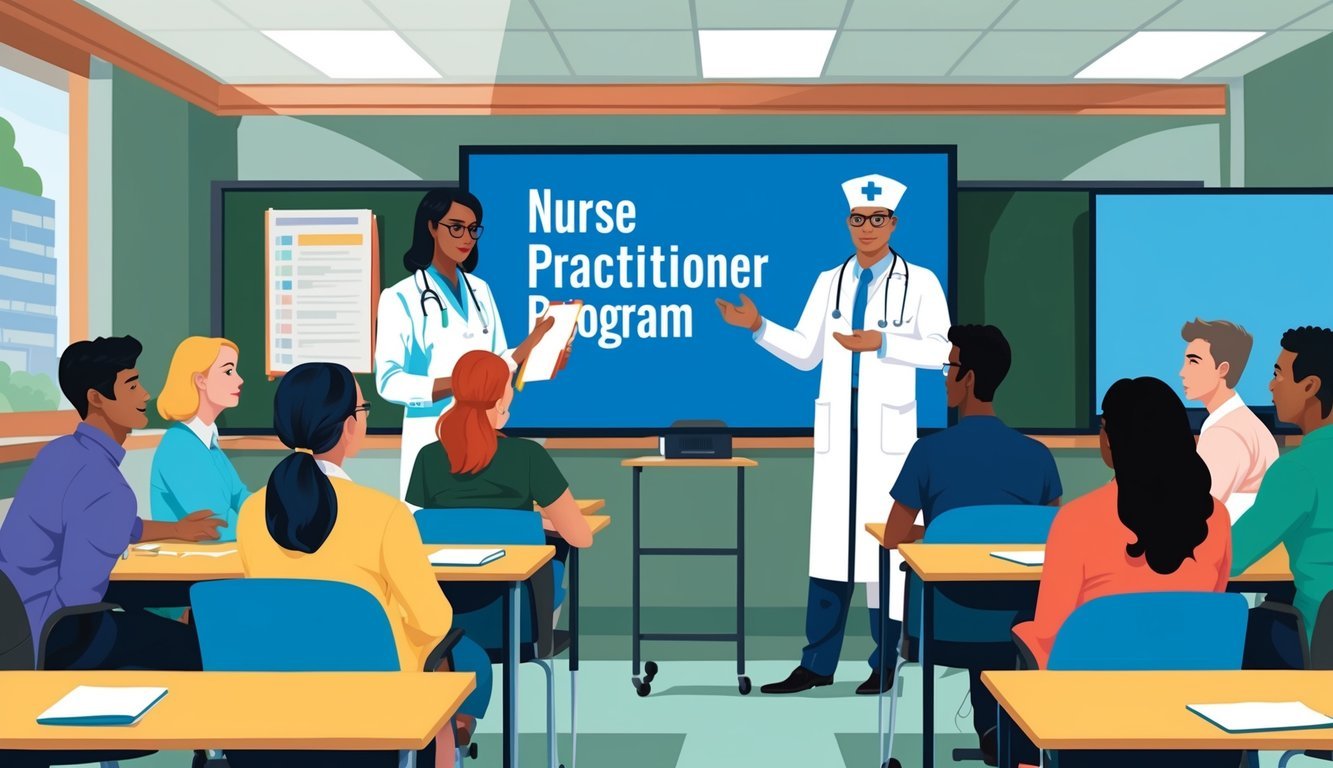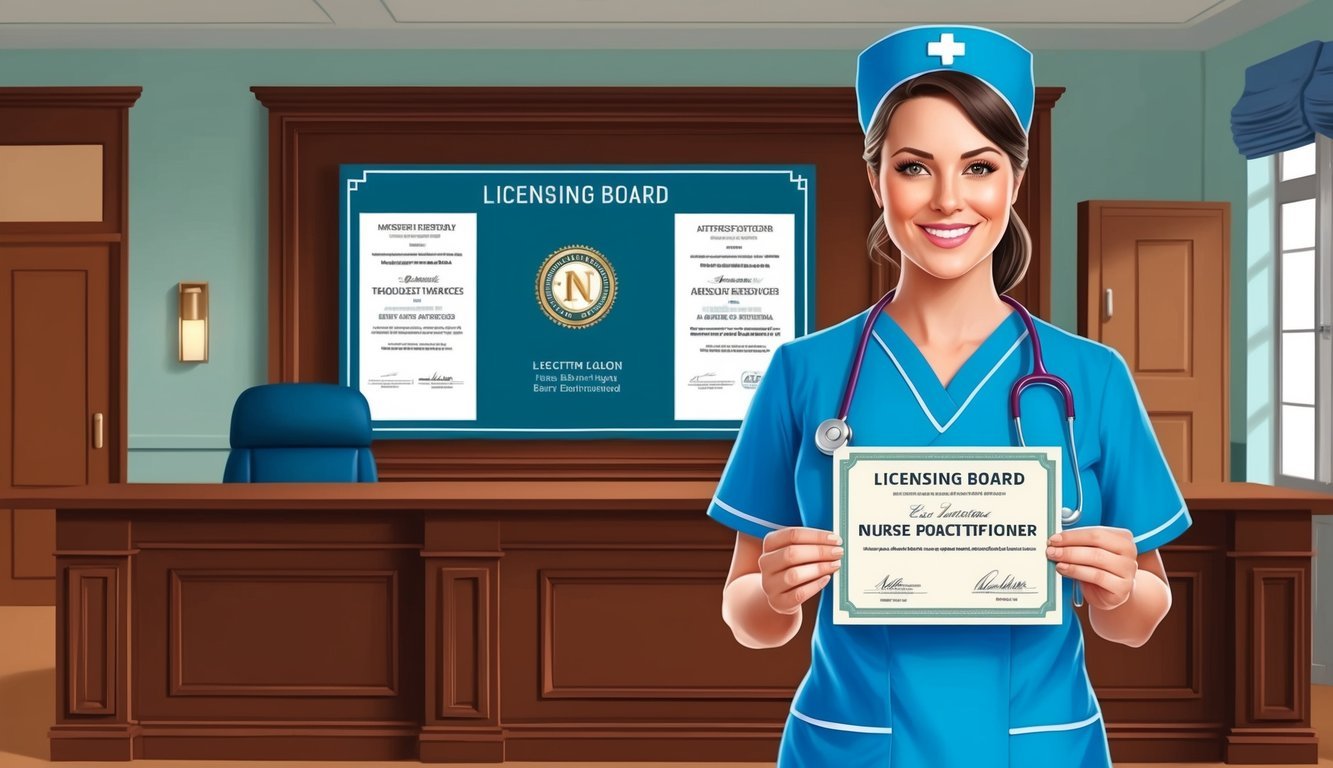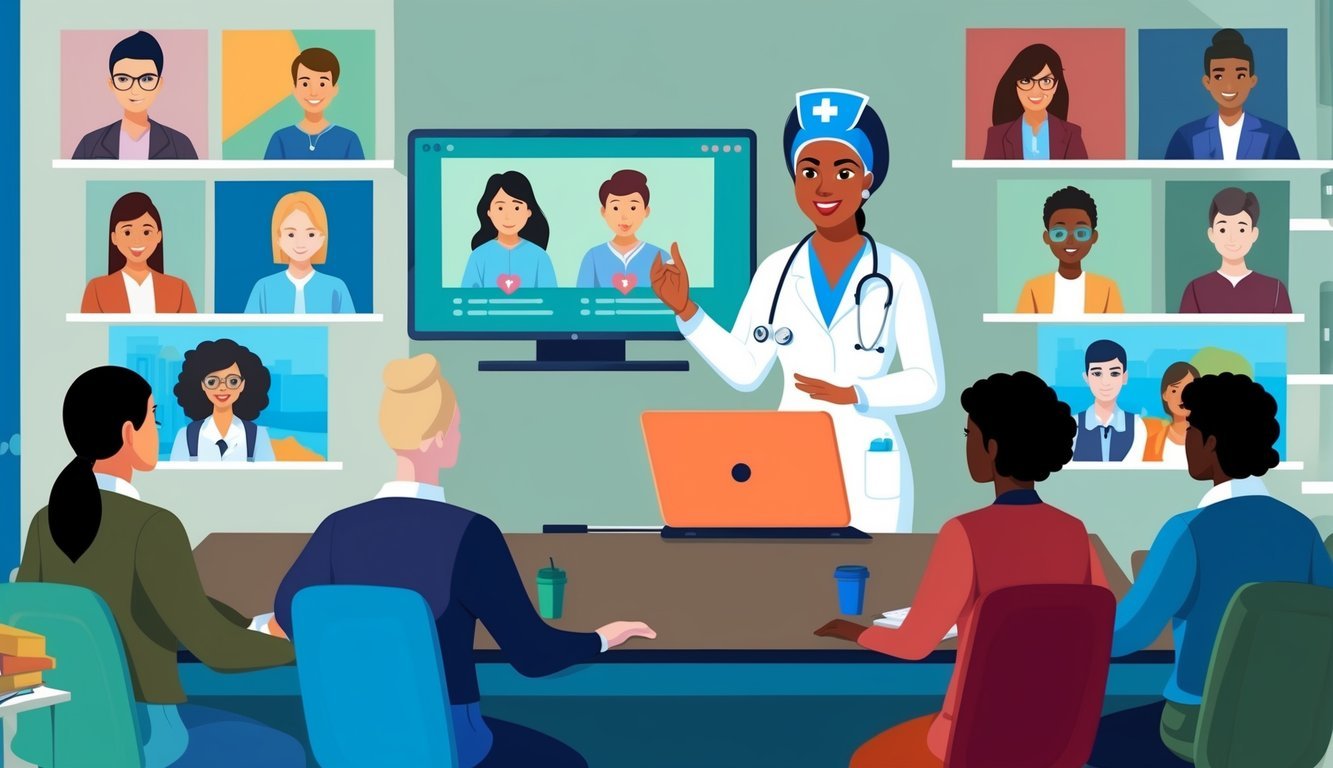In-person nurse practitioner programs offer a vital pathway to advancing your nursing career. These programs equip you with the skills and knowledge needed to provide high-quality healthcare in a variety of settings. By choosing an in-person format, you gain hands-on experience, direct mentorship, and the opportunity to collaborate with peers and faculty in real-time, enhancing your learning experience.
You may wonder what to expect from these programs.
Typically, they include a comprehensive curriculum covering essential topics such as patient care, diagnostics, and pharmacology.
Additionally, you will prepare for licensing and certification exams, which are crucial for your practice as a nurse practitioner.
Having a clear understanding of these components is essential as you navigate your educational journey.
As you consider enrolling in a nurse practitioner program, remember that financial aid options are often available to help you manage tuition costs.
Engaging with in-person courses not only enriches your educational experience but also builds a strong professional network that can benefit you throughout your career.
Key Takeaways
- In-person programs provide essential hands-on training and mentorship.
- Comprehensive curricula prepare you for licensing and certification.
- Financial aid options can make education more accessible.
Overview of Nurse Practitioner Programs

Nurse practitioner programs provide essential education for advanced practice nurses.
Understanding accreditation, degree pathways, and program requirements is crucial as you consider pursuing this career.
Accreditation Standards
Accreditation is vital for ensuring the quality and credibility of nurse practitioner programs.
It signifies that a program meets specific educational standards set by recognized bodies.
The two primary accrediting organizations are the Commission on Collegiate Nursing Education (CCNE) and the Accreditation Commission for Education in Nursing (ACEN).
Programs that hold accreditation provide a higher level of education, which is often a requirement for certification and licensure.
Always check if the program you choose is accredited to ensure it prepares you adequately for the nurse practitioner role.
Degree Pathways
There are several degree pathways you can pursue to become a nurse practitioner.
The most common ones include:
- Master of Science in Nursing (MSN): This is often required for entry-level nurse practitioners. It typically involves coursework in advanced clinical skills, health assessment, and pharmacology.
- Doctor of Nursing Practice (DNP): This is a terminal degree that emphasizes clinical practice. Programs usually focus on leadership, evidence-based practice, and systems thinking.
- Family Nurse Practitioner (FNP): This specific track within the MSN or DNP prepares you for providing primary care across the lifespan.
Choosing the right pathway will depend on your career goals and the population you wish to serve.
Program Requirements
Nurse practitioner programs have specific requirements that you must meet for admission.
Common prerequisites include:
- An active registered nurse license
- A Bachelor of Science in Nursing (BSN)
- Clinical experience as a registered nurse
Most programs also require standardized test scores, such as the GRE, along with letters of recommendation and personal essays.
Once admitted, you will engage in both classroom learning and clinical practicum experiences.
This combination equips you with the knowledge and skills needed for patient care.
It’s essential to review the specific requirements of each program carefully to ensure you can meet them.
Educational Curriculum

The educational curriculum for in-person nurse practitioner programs is designed to equip you with comprehensive knowledge and practical skills.
It includes core courses, specialized tracks, and a balance of clinical and theoretical components to prepare you for advanced nursing roles.
Core Courses
Core courses are fundamental to your education as a nurse practitioner.
These include subjects like pathophysiology, pharmacology, and health assessment.
| Course | Description |
|---|---|
| Pathophysiology | Study of disease processes and their effects on the body. |
| Pharmacology | Knowledge of medication types, uses, and side effects. |
| Health Assessment | Techniques for evaluating patient health through clinical exams. |
These classes provide the foundational knowledge necessary for diagnosing and treating patients.
Mastery of these subjects enhances your ability to make informed decisions in clinical practice.
Specialized Tracks
Different nurse practitioner programs offer specialized tracks tailored to specific populations or healthcare needs.
Some common tracks include:
- Family Nurse Practitioner (FNP): Focuses on comprehensive care for families across the lifespan.
- Pediatric Nurse Practitioner (PNP): Specializes in the health management of infants, children, and adolescents.
- Psychiatric Nurse Practitioner (PMHNP): Concentrates on mental health assessment and therapy.
- Adult-Gerontology Nurse Practitioner (AGNP): Addresses health concerns of adults and the elderly.
Each track has unique requirements and coursework that help you develop targeted expertise for your chosen specialty.
This specialization prepares you to meet the specific needs of your patient population effectively.
Clinical and Theoretical Components
Your nurse practitioner program will include both clinical hours and theoretical learning.
The clinical component provides hands-on experience in healthcare settings, where you apply your skills under supervision.
Theoretical components will reinforce your understanding of clinical practices through in-depth discussions, case studies, and research.
- Clinical Hours: Typically, you must complete between 500-1,000 hours of clinical experience, depending on your program.
- Practical Skills: Training involves procedures, patient interaction, and interdisciplinary collaboration.
Both components are essential for ensuring that you are competent and confident as you enter the nursing profession.
This integrated approach to learning lays the groundwork for your future success in a variety of nurse practitioner roles.
Licensing and Certification

To practice as a nurse practitioner (NP), you must obtain the necessary licenses and certifications.
These credentials ensure you meet the standards required to deliver quality healthcare.
It is essential to understand the key components of national certification examinations, state RN licensure, and the various board certification options available to you.
National Certification Examinations
National certification is a critical step after earning your degree.
You will have to pass a certification exam to become a Certified Family Nurse Practitioner (CFNP) or in another specialty.
Two main organizations offer certification for NPs:
| Certification Body | Exam Offered |
|---|---|
| ANCC | Family Nurse Practitioner Certification Examination |
| AANP | Nurse Practitioner Certification Examination |
These exams assess your knowledge and skills.
To prepare, review the exam content outlines and consider taking practice tests to increase your chances of success.
State RN Licensure
Before you can begin your NP practice, you must hold a valid registered nurse (RN) license in your state.
Each state has specific requirements for licensure.
Generally, you will need:
- A completed nursing degree from an accredited program.
- Passing scores on the NCLEX-RN exam.
- Background check and any other state-specific requirements.
Check with your state’s nursing board for precise information.
You can find details at the National Council of State Boards of Nursing (NCSBN).
Board Certification Options
After becoming nationally certified, you may pursue additional board certifications to enhance your qualifications and competitiveness.
These certifications validate your expertise in specific areas.
Common options include:
- Family Nurse Practitioner (FNP)
- Pediatric Nurse Practitioner (PNP)
- Adult-Gerontology Nurse Practitioner (AGNP)
Board certifications may also require continuing education credits and periodic renewal.
Ensure you stay updated with your respective certification body for any changes in requirements, which can frequently occur.
Online Learning and Distance Education

Online learning for nurse practitioner programs offers flexibility and accessibility.
You can study from anywhere and often at your own pace.
However, it also comes with its challenges.
Benefits and Challenges
One of the main benefits of online nurse practitioner programs is flexibility.
You can create a study schedule that fits your life.
Many programs offer recorded lectures and digital resources, letting you learn whenever you want.
There are some challenges, though.
Online learning requires self-discipline and time management skills.
You may miss the face-to-face interaction in traditional classrooms.
Staying motivated can be tougher without a physical classroom environment.
Technology and Learning Platforms
Technology plays a crucial role in distance learning.
Most online nurse practitioner programs use specialized platforms for teaching.
You might encounter systems like Blackboard or Canvas, which provide access to resources, discussions, and assignments.
Key technologies include:
- Video Conferencing: Tools like Zoom or Microsoft Teams for live classes.
- Learning Management Systems: Platforms that organize course materials.
- Simulation Software: Programs that help you practice clinical skills virtually.
These tools enhance learning but require a reliable internet connection and basic tech skills.
Best Practices for Online Students
To succeed in online nurse practitioner programs, follow these best practices:
- Create a Dedicated Study Space: Have a specific area at home for studying to minimize distractions.
- Set a Schedule: Plan your study times and stick to them to maintain consistency.
- Engage in Discussions: Participate in online forums and group work. This helps you connect with your peers and faculty.
- Own Your Learning: Take responsibility for your education by reaching out for help when needed.
Utilizing these strategies can significantly enhance your learning experience in online and distance education programs.
Consider exploring top online nurse practitioner programs to find the right fit for you.
Financial Aid and Support

Finding financial aid and support can make a significant difference in your journey toward becoming a nurse practitioner.
There are various options available to help cover tuition and related costs.
You can explore scholarships and loan programs designed for nursing students.
Scholarship Opportunities
Many organizations provide scholarships specifically for nursing students.
These scholarships can help reduce your tuition costs, making it more affordable for you to complete your in-person nurse practitioner program.
Here are some prominent scholarship options:
-
AANP Scholarships: Offered by the American Association of Nurse Practitioners, these scholarships provide $2,500 to $5,000 for eligible students enrolled in NP programs. You can learn more at the AANP website.
-
State and University Scholarships: Check your state’s nurse association and your university’s financial aid office for specific scholarships available to nursing students.
Loan Programs and Repayment
Loan programs can also help finance your education, and there are options designed for nursing students that often come with lower interest rates or favorable repayment terms.
Consider these programs:
-
Federal Direct Loans: You can apply for subsidized and unsubsidized loans through the Federal Student Aid website. These loans typically offer lower interest rates compared to private loans.
-
Nurse Corps Loan Repayment Program: This federal program repays up to 85% of your unpaid nursing school loans if you work in a critical shortage facility.
By researching these options, you can find effective financial strategies to support your education and career in nursing.
Frequently Asked Questions
When considering an in-person nurse practitioner program, you may have specific questions about enrollment requirements, program duration, and career opportunities.
Understanding these aspects can help you make an informed decision about your education and future career path.
What are the requirements for enrolling in an in-person nurse practitioner program?
Most in-person nurse practitioner programs require you to have a Bachelor of Science in Nursing (BSN) or an equivalent degree.
You may also need a valid nursing license.
Some programs also require clinical experience.
Some schools may assess your GPA and entrance exam scores as part of the admission process.
How long does it typically take to complete an in-person nurse practitioner program?
An in-person nurse practitioner program usually takes 2 to 3 years to complete.
Full-time programs can often be finished in about 2 years, while part-time options may extend this timeline.
Your specific duration may vary based on course load and program structure.
What are the characteristics of the highest-ranked in-person nurse practitioner programs?
The top-ranked in-person NP programs often have a strong faculty, a comprehensive curriculum, and robust clinical opportunities.
Accreditation is also important.
Programs with high graduation rates and successful certification exam pass rates are often considered more reputable.
What postgraduate career opportunities are available after completing an in-person nurse practitioner program?
After finishing your program, you can work in various settings, such as hospitals, clinics, or private practices.
Common roles include family nurse practitioner, psychiatric nurse practitioner, and pediatric nurse practitioner.
Your specialization will determine the specific opportunities available to you.
How do in-person nurse practitioner program curricula differ from online NP program curricula?
In-person programs generally focus on hands-on training and direct patient care.
They often include more supervised clinical hours compared to online programs.
In-person settings facilitate collaboration with peers and faculty, which can enhance learning and practical skills.
What are the financial considerations for attending an in-person nurse practitioner program?
Tuition for in-person NP programs can be significant.
It often ranges from $20,000 to $100,000 for the entire program.
You should also consider additional costs such as books, supplies, and living expenses.
Financial aid options, scholarships, and work-study programs may help offset some costs.

